牛津译林版(2019)必修第二册Unit 4 Exploring literature Grammar and usage 课件(共23张PPT)
文档属性
| 名称 | 牛津译林版(2019)必修第二册Unit 4 Exploring literature Grammar and usage 课件(共23张PPT) |
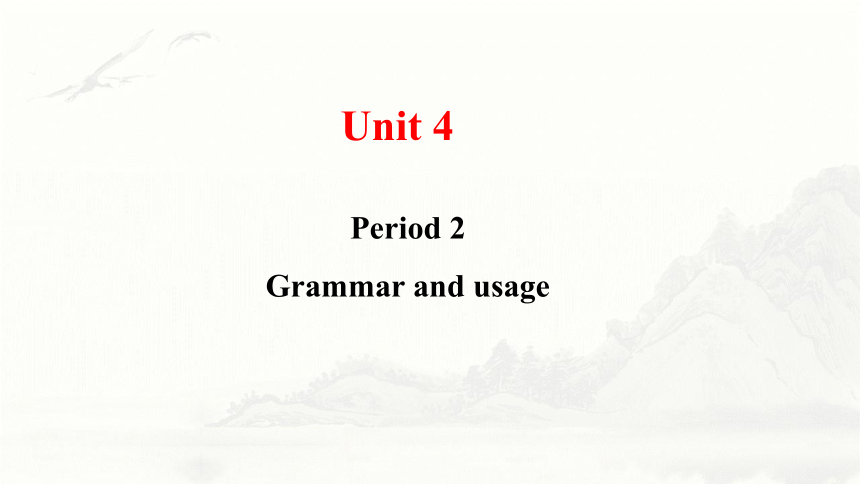
|
|
| 格式 | pptx | ||
| 文件大小 | 939.3KB | ||
| 资源类型 | 教案 | ||
| 版本资源 | 牛津译林版(2019) | ||
| 科目 | 英语 | ||
| 更新时间 | 2024-01-22 17:48:21 | ||
图片预览

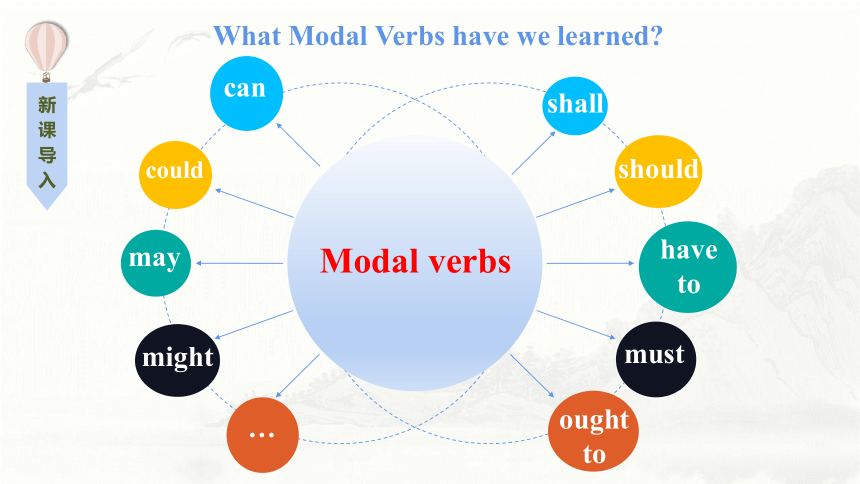
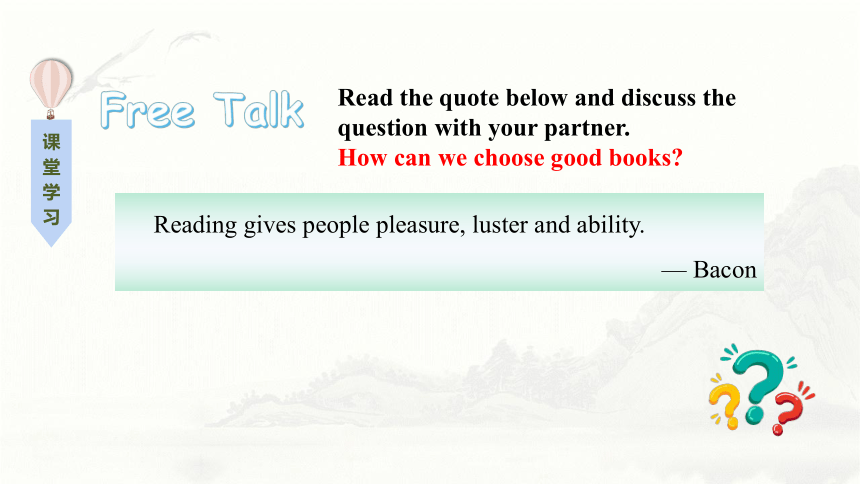
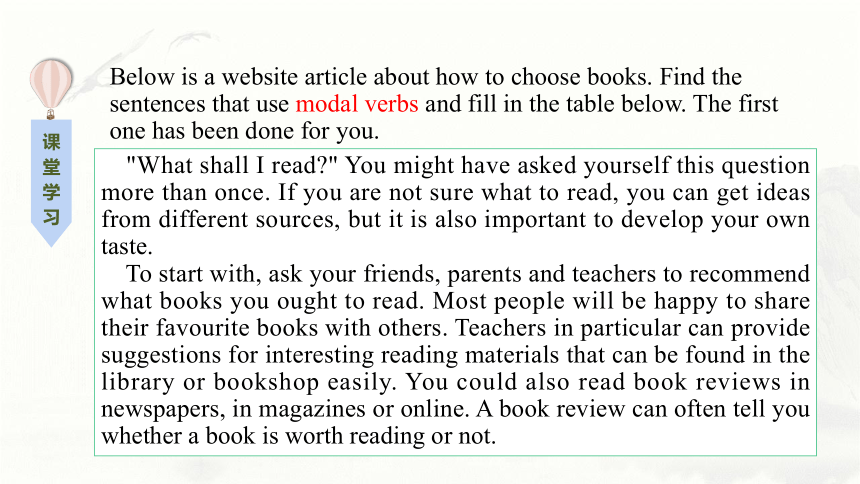
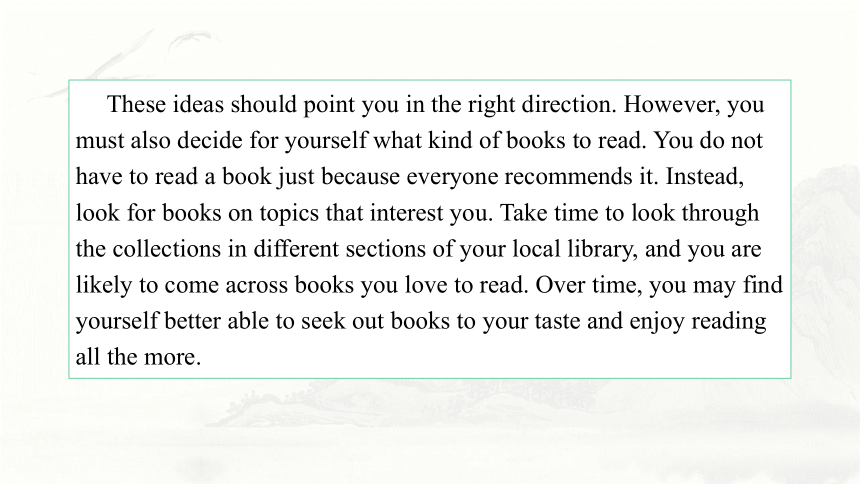
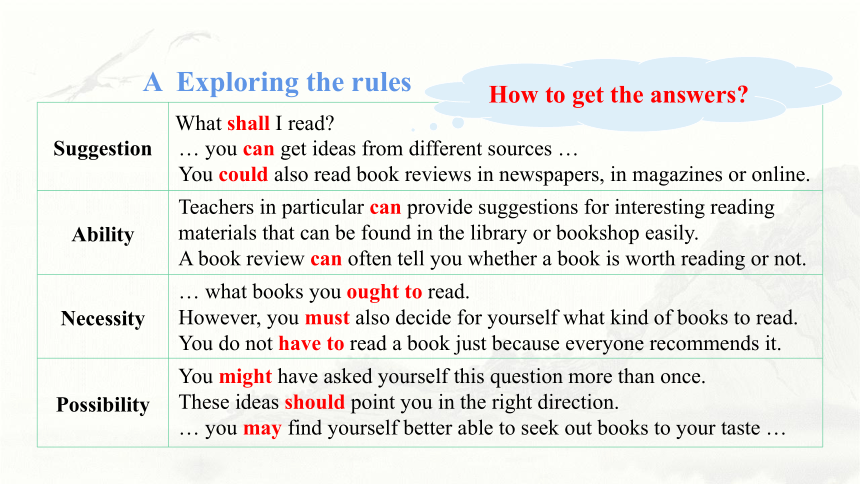
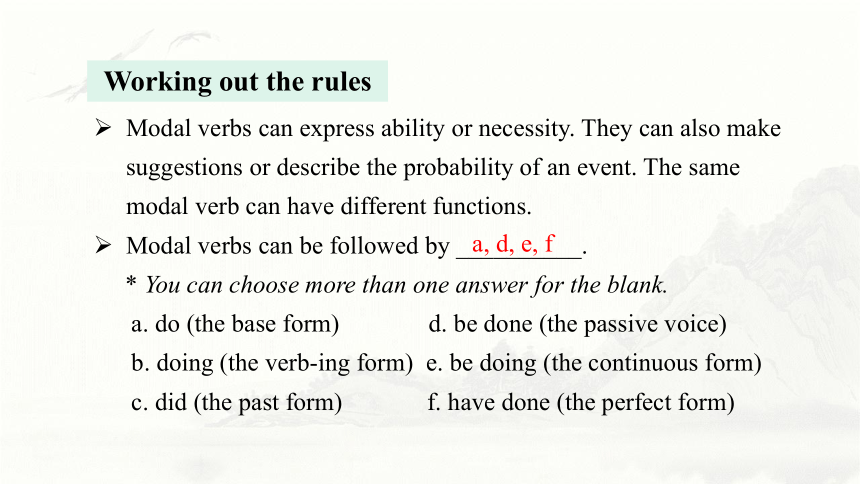
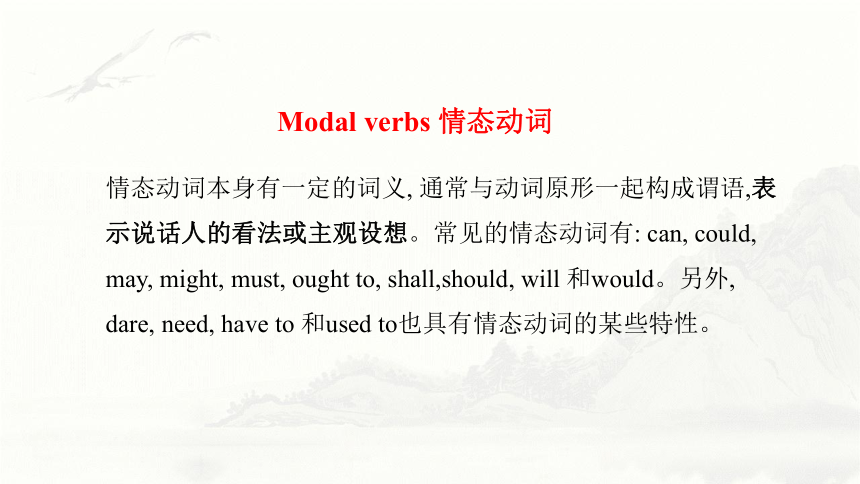
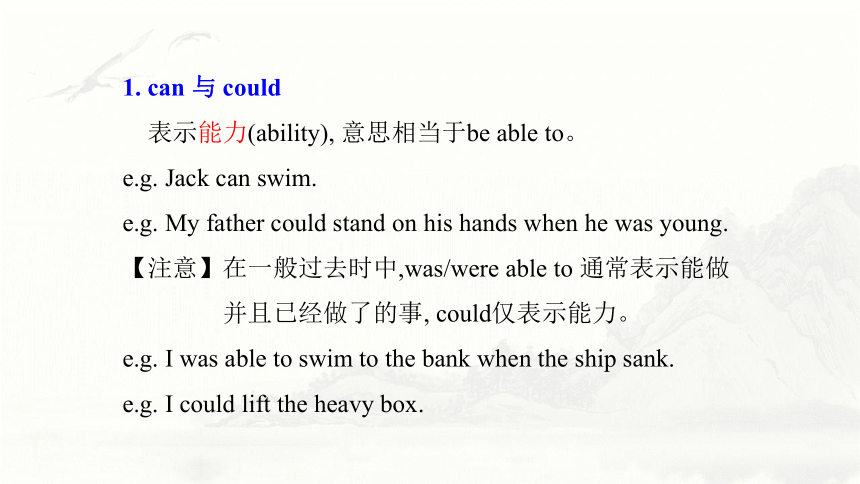
文档简介
(共23张PPT)
Unit 4
Period 2
Grammar and usage
新 课 导 入
What Modal Verbs have we learned
Modal verbs
could
may
might
shall
should
have to
must
ought
to
…
can
课 堂 学 习
Read the quote below and discuss the question with your partner.
How can we choose good books
Reading gives people pleasure, luster and ability.
— Bacon
Free Talk
课 堂 学 习
Below is a website article about how to choose books. Find the sentences that use modal verbs and fill in the table below. The first one has been done for you.
"What shall I read " You might have asked yourself this question more than once. If you are not sure what to read, you can get ideas from different sources, but it is also important to develop your own taste.
To start with, ask your friends, parents and teachers to recommend what books you ought to read. Most people will be happy to share their favourite books with others. Teachers in particular can provide suggestions for interesting reading materials that can be found in the library or bookshop easily. You could also read book reviews in newspapers, in magazines or online. A book review can often tell you whether a book is worth reading or not.
These ideas should point you in the right direction. However, you must also decide for yourself what kind of books to read. You do not have to read a book just because everyone recommends it. Instead, look for books on topics that interest you. Take time to look through the collections in different sections of your local library, and you are likely to come across books you love to read. Over time, you may find yourself better able to seek out books to your taste and enjoy reading all the more.
A Exploring the rules
Suggestion What shall I read
Ability
Necessity
Possibility
… you can get ideas from different sources …
You could also read book reviews in newspapers, in magazines or online.
Teachers in particular can provide suggestions for interesting reading materials that can be found in the library or bookshop easily.
A book review can often tell you whether a book is worth reading or not.
… what books you ought to read.
However, you must also decide for yourself what kind of books to read.
You do not have to read a book just because everyone recommends it.
You might have asked yourself this question more than once.
These ideas should point you in the right direction.
… you may find yourself better able to seek out books to your taste …
How to get the answers
Working out the rules
Modal verbs can express ability or necessity. They can also make suggestions or describe the probability of an event. The same modal verb can have different functions.
Modal verbs can be followed by __________.
* You can choose more than one answer for the blank.
a. do (the base form) d. be done (the passive voice)
b. doing (the verb-ing form) e. be doing (the continuous form)
c. did (the past form) f. have done (the perfect form)
a, d, e, f
Modal verbs 情态动词
情态动词本身有一定的词义, 通常与动词原形一起构成谓语,表示说话人的看法或主观设想。常见的情态动词有: can, could, may, might, must, ought to, shall,should, will 和would。另外, dare, need, have to 和used to也具有情态动词的某些特性。
1. can 与 could
表示能力(ability), 意思相当于be able to。
e.g. Jack can swim.
e.g. My father could stand on his hands when he was young.
【注意】在一般过去时中,was/were able to 通常表示能做
并且已经做了的事, could仅表示能力。
e.g. I was able to swim to the bank when the ship sank.
e.g. I could lift the heavy box.
2. must与need
表示必要性(necessity)。must意为“必须“,否定式mustn't意为“不许”; need意为“需要”,否定式needn't意为“不必”。
e.g. I must go now.
e.g. You mustn't forget your ticket.
e.g. Need we go right now
e.g. You needn't do it if you don't want to.
【注意】have to也有“必须”的含义,但侧重客观需求,有时态的变化,否定式是don't/ doesn't have to,意为“不必”,意思相当于needn't。
e.g. We will have to think of a new plan.
e.g. You don't have to run.
3. can, could, may与 might
表示许可(permission)。表示许可时, may多用于正式场合, could 和 might 的语气更委婉些。
e.g. You can use my pen if you like.
e.g. Students may not bring their pets to school.
e.g. Could/Might I borrow your bike
4. can, could, may, might 与 must
表示可能性(possibility)。 may, might 和 could常用于肯定句,意为“可能”, must 用于肯定句, 意为“一定”; 否定式may/might not意为“可能不”, can't/couldn't 意为 “不可能,肯定不”。
e.g. That may/might/could be a good idea.
e.g. You must be tired after the long journey.
e.g. There may not be enough money to pay for a new car.
e.g. Your story can't/couldn't be true.
【注意】can表示可能性时,含“有时会”的意思。
e.g. The temperature here can be as high as 37°C.
5. should 与ought to
表示义务(obligation) 或建议(suggestion), 意为“应该”。
e.g. They should/ought to build more libraries.
【注意】should 与ought to也可以表示主观判断, 意思是
“可能会, 应该会”,相当于 will probably。
e.g. The rain should/ought to stop soon.
6. will 与would
(1) 表示习惯性动作(habit)。will 表示现在的习惯,would表示过去的习惯。
e.g. Mary will listen to music for hours in her room.
e.g. I would take a walk after supper when I was young.
(2) 表示意愿(willingness)。e.g. The baby won's go to sleep.
(3) 表示请求(request), would 比 will 更委婉些。
e.g. Would you give me some advice
【注意】used to也表示过去的习惯性动作,多用于非正式场合,往往指后来
停止了的动作。否定形式是didn't use to 或 used not to。
e.g. I used to have a bicycle, but I sold it.
e.g. John didn't use to come here.
e.g. Did Mike use to read newspapers
7. shall
(1)在疑问句中,表示建议或征求意见。
e.g. Shall I help you with the box
(2) 表示承诺或要求。
e.g. You shall have the magazine.
e.g. He shall do as I tell him.
(3) 用于正式文件、法律、规章制度等, 表示规定。
e.g. Students shall not use calculators during exams.
8. dare 与 need
dare和need作为情态动词,常用于疑问句和否定句中。
这两个词也可以用作实义动词。
e.g. I dare not go there alone.
I didn't dare to say a word.
Nobody dared to ask any questions.
e.g. Need we finish the work today
You needn't worry about it.
You don't need to come yourself.
9. 情态动词的进行式、完成式和被动式
(1) 情态动词可以与主动词的进行式合用, 表示某动作正在进行。
e.g. Jack may be reading in the library.
(2) 情态动词可以与主动词的完成式合用, 表示过去发生的动作。
e.g. Tom must have arrived home by now.
e.g. You can't have seen Henry yesterday because he was in London.
(3) 情态动词可以与主动词的被动式合用。
e.g. The road may be blocked.
How can we deal with exercises concerning modal verbs
Language context (上下文、语境)
Functions & usages of modal verbs
Thinking
For the following groups of three sentences, tick the sentence which uses the modal verb differently from the other two.
B1
B Applying the rules
1. a Can I keep the book for more than two weeks
b Nick can read more in an afternoon than I can in a week!
c Can Mary finish War and Peace in a month
2. a I am afraid I may be unable to finish this novel today.
b It may be difficult for people to agree on what good literature is.
c You may go to the library tomorrow afternoon, if you have time.
3. a I must finish writing the book review and hand it in before Wednesday.
b You must be tired after three hours' reading.
c Students must develop the habit of reading classic literature.
4. a Henry should be reading books in the library.
b I have fifty dollars-that should be enough for three books.
c Reading English novels has greatly increased my vocabulary—you should try it too.
√
√
√
√
Below is an entry in a student's reading plete the entry with the correct modal verbs in the brackets.
B2
When my English teacher suggested that I read Charles Dickens's A Christmas Carol, I thought, "I (1)_____(can't/shouldn't) read this! It (2)_____ (has to/must) be very boring!" Surprisingly,
it turned out the exact opposite. I (3)______ (could/might) not stop turning the pages!
The book's main character is Scrooge, a rich but mean old man. He hates all kinds of celebrations. On Christmas Eve, he is transported to different points in his life by three spirits. In the end, he reflects on these moments and realizes his mistakes. Then he decides that he (4)_____ (might/must) change himself. On Christmas morning, he sends a large turkey to a poor man for Christmas dinner. He also tries to make his family and friends happy by spending time with them.
There is something that (5)____(can/must) be learnt from A Christmas Carol: we (6)________ (should/may) treat others with kindness, generosity and love. I think everyone (7)________ (would/ought to) read this book.
can’t
must
could
must
can
should
ought to
In pairs, make rules for your school library using modal verbs. Use the following examples to help you.
B3
You must not bring food or drinks.
You cannot take the books out of the reading room.
Examples
A sample
You must study quietly in the reading room.
You must not eat or drink in the library.
You can use the computers to find books in our library.
You can borrow two books at a time and keep them for
as long as two weeks.
Do you know the usage of modal verbs and how to use modal verbs in real conditions
Unit 4
Period 2
Grammar and usage
新 课 导 入
What Modal Verbs have we learned
Modal verbs
could
may
might
shall
should
have to
must
ought
to
…
can
课 堂 学 习
Read the quote below and discuss the question with your partner.
How can we choose good books
Reading gives people pleasure, luster and ability.
— Bacon
Free Talk
课 堂 学 习
Below is a website article about how to choose books. Find the sentences that use modal verbs and fill in the table below. The first one has been done for you.
"What shall I read " You might have asked yourself this question more than once. If you are not sure what to read, you can get ideas from different sources, but it is also important to develop your own taste.
To start with, ask your friends, parents and teachers to recommend what books you ought to read. Most people will be happy to share their favourite books with others. Teachers in particular can provide suggestions for interesting reading materials that can be found in the library or bookshop easily. You could also read book reviews in newspapers, in magazines or online. A book review can often tell you whether a book is worth reading or not.
These ideas should point you in the right direction. However, you must also decide for yourself what kind of books to read. You do not have to read a book just because everyone recommends it. Instead, look for books on topics that interest you. Take time to look through the collections in different sections of your local library, and you are likely to come across books you love to read. Over time, you may find yourself better able to seek out books to your taste and enjoy reading all the more.
A Exploring the rules
Suggestion What shall I read
Ability
Necessity
Possibility
… you can get ideas from different sources …
You could also read book reviews in newspapers, in magazines or online.
Teachers in particular can provide suggestions for interesting reading materials that can be found in the library or bookshop easily.
A book review can often tell you whether a book is worth reading or not.
… what books you ought to read.
However, you must also decide for yourself what kind of books to read.
You do not have to read a book just because everyone recommends it.
You might have asked yourself this question more than once.
These ideas should point you in the right direction.
… you may find yourself better able to seek out books to your taste …
How to get the answers
Working out the rules
Modal verbs can express ability or necessity. They can also make suggestions or describe the probability of an event. The same modal verb can have different functions.
Modal verbs can be followed by __________.
* You can choose more than one answer for the blank.
a. do (the base form) d. be done (the passive voice)
b. doing (the verb-ing form) e. be doing (the continuous form)
c. did (the past form) f. have done (the perfect form)
a, d, e, f
Modal verbs 情态动词
情态动词本身有一定的词义, 通常与动词原形一起构成谓语,表示说话人的看法或主观设想。常见的情态动词有: can, could, may, might, must, ought to, shall,should, will 和would。另外, dare, need, have to 和used to也具有情态动词的某些特性。
1. can 与 could
表示能力(ability), 意思相当于be able to。
e.g. Jack can swim.
e.g. My father could stand on his hands when he was young.
【注意】在一般过去时中,was/were able to 通常表示能做
并且已经做了的事, could仅表示能力。
e.g. I was able to swim to the bank when the ship sank.
e.g. I could lift the heavy box.
2. must与need
表示必要性(necessity)。must意为“必须“,否定式mustn't意为“不许”; need意为“需要”,否定式needn't意为“不必”。
e.g. I must go now.
e.g. You mustn't forget your ticket.
e.g. Need we go right now
e.g. You needn't do it if you don't want to.
【注意】have to也有“必须”的含义,但侧重客观需求,有时态的变化,否定式是don't/ doesn't have to,意为“不必”,意思相当于needn't。
e.g. We will have to think of a new plan.
e.g. You don't have to run.
3. can, could, may与 might
表示许可(permission)。表示许可时, may多用于正式场合, could 和 might 的语气更委婉些。
e.g. You can use my pen if you like.
e.g. Students may not bring their pets to school.
e.g. Could/Might I borrow your bike
4. can, could, may, might 与 must
表示可能性(possibility)。 may, might 和 could常用于肯定句,意为“可能”, must 用于肯定句, 意为“一定”; 否定式may/might not意为“可能不”, can't/couldn't 意为 “不可能,肯定不”。
e.g. That may/might/could be a good idea.
e.g. You must be tired after the long journey.
e.g. There may not be enough money to pay for a new car.
e.g. Your story can't/couldn't be true.
【注意】can表示可能性时,含“有时会”的意思。
e.g. The temperature here can be as high as 37°C.
5. should 与ought to
表示义务(obligation) 或建议(suggestion), 意为“应该”。
e.g. They should/ought to build more libraries.
【注意】should 与ought to也可以表示主观判断, 意思是
“可能会, 应该会”,相当于 will probably。
e.g. The rain should/ought to stop soon.
6. will 与would
(1) 表示习惯性动作(habit)。will 表示现在的习惯,would表示过去的习惯。
e.g. Mary will listen to music for hours in her room.
e.g. I would take a walk after supper when I was young.
(2) 表示意愿(willingness)。e.g. The baby won's go to sleep.
(3) 表示请求(request), would 比 will 更委婉些。
e.g. Would you give me some advice
【注意】used to也表示过去的习惯性动作,多用于非正式场合,往往指后来
停止了的动作。否定形式是didn't use to 或 used not to。
e.g. I used to have a bicycle, but I sold it.
e.g. John didn't use to come here.
e.g. Did Mike use to read newspapers
7. shall
(1)在疑问句中,表示建议或征求意见。
e.g. Shall I help you with the box
(2) 表示承诺或要求。
e.g. You shall have the magazine.
e.g. He shall do as I tell him.
(3) 用于正式文件、法律、规章制度等, 表示规定。
e.g. Students shall not use calculators during exams.
8. dare 与 need
dare和need作为情态动词,常用于疑问句和否定句中。
这两个词也可以用作实义动词。
e.g. I dare not go there alone.
I didn't dare to say a word.
Nobody dared to ask any questions.
e.g. Need we finish the work today
You needn't worry about it.
You don't need to come yourself.
9. 情态动词的进行式、完成式和被动式
(1) 情态动词可以与主动词的进行式合用, 表示某动作正在进行。
e.g. Jack may be reading in the library.
(2) 情态动词可以与主动词的完成式合用, 表示过去发生的动作。
e.g. Tom must have arrived home by now.
e.g. You can't have seen Henry yesterday because he was in London.
(3) 情态动词可以与主动词的被动式合用。
e.g. The road may be blocked.
How can we deal with exercises concerning modal verbs
Language context (上下文、语境)
Functions & usages of modal verbs
Thinking
For the following groups of three sentences, tick the sentence which uses the modal verb differently from the other two.
B1
B Applying the rules
1. a Can I keep the book for more than two weeks
b Nick can read more in an afternoon than I can in a week!
c Can Mary finish War and Peace in a month
2. a I am afraid I may be unable to finish this novel today.
b It may be difficult for people to agree on what good literature is.
c You may go to the library tomorrow afternoon, if you have time.
3. a I must finish writing the book review and hand it in before Wednesday.
b You must be tired after three hours' reading.
c Students must develop the habit of reading classic literature.
4. a Henry should be reading books in the library.
b I have fifty dollars-that should be enough for three books.
c Reading English novels has greatly increased my vocabulary—you should try it too.
√
√
√
√
Below is an entry in a student's reading plete the entry with the correct modal verbs in the brackets.
B2
When my English teacher suggested that I read Charles Dickens's A Christmas Carol, I thought, "I (1)_____(can't/shouldn't) read this! It (2)_____ (has to/must) be very boring!" Surprisingly,
it turned out the exact opposite. I (3)______ (could/might) not stop turning the pages!
The book's main character is Scrooge, a rich but mean old man. He hates all kinds of celebrations. On Christmas Eve, he is transported to different points in his life by three spirits. In the end, he reflects on these moments and realizes his mistakes. Then he decides that he (4)_____ (might/must) change himself. On Christmas morning, he sends a large turkey to a poor man for Christmas dinner. He also tries to make his family and friends happy by spending time with them.
There is something that (5)____(can/must) be learnt from A Christmas Carol: we (6)________ (should/may) treat others with kindness, generosity and love. I think everyone (7)________ (would/ought to) read this book.
can’t
must
could
must
can
should
ought to
In pairs, make rules for your school library using modal verbs. Use the following examples to help you.
B3
You must not bring food or drinks.
You cannot take the books out of the reading room.
Examples
A sample
You must study quietly in the reading room.
You must not eat or drink in the library.
You can use the computers to find books in our library.
You can borrow two books at a time and keep them for
as long as two weeks.
Do you know the usage of modal verbs and how to use modal verbs in real conditions
